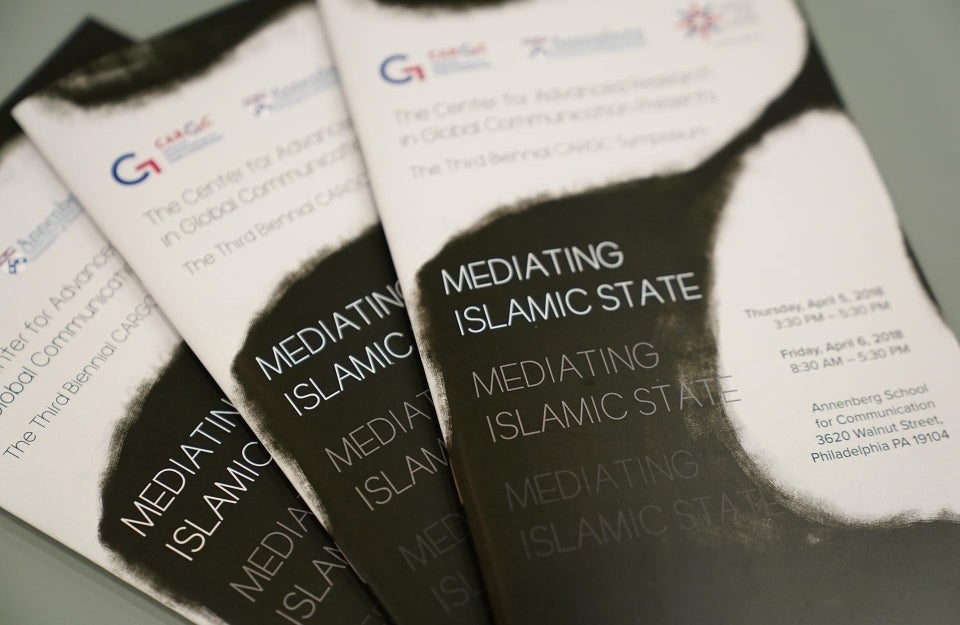CARGC Press Co-Publishes Special Section on “Mediating Islamic State” with International Journal of Communication
The articles suggest imaginative avenues to understand phenomena like Islamic State.

This special section on Mediating Islamic State gathers emergent scholarly voices, many deploying humanistic inquiry, to probe a phenomenon that has predominantly been the province of social scientists, in order to explore and understand the players, patterns, and practices that have mediated Islamic State: the communicative ways in which the group has been studied, reported on, visualized, narrated, mocked, spoofed, and resisted. We use “mediation” rather than “media” to shift public discourse on Islamic State beyond the focus on technology that has characterized research on media and sociopolitical change generally, and Islamic State communication in particular. Mediation connotes a broad approach to media, which includes words, images, bodies, platforms, and the expressive capacities and meaning-making practices that communicators generate when they deploy these media.
Originally presented at the Third Biennial Symposium of the Center for Advanced Research in Global Communication (CARGC) at the Annenberg School for Communication, University of Pennsylvania, contributions tackle popular culture as a dynamic context for meaning creation, within a framework of media and culture as formative of identity and community, and not merely as conveyors of ideas, images, and information. Grounded in CARGC’s mission to advance a global media studies that fuses multidisciplinary regional knowledge with theory and methodology in the humanities and social sciences, we hope this special section continues spurring critical conversations that promise a new understanding of the transnational nexus of communication, identity, and violence. Together, these articles suggest imaginative avenues to understand phenomena like Islamic State beyond the narrow lens of what communication scholars would call administrative research within a national security paradigm.
Co-edited by CARGC Director Marwan M. Kraidy and CARGC Project Coordinator Marina R. Krikorian, and including articles co-authored by CARGC Doctoral Fellows and Annenberg PhD students Heather Jaber and Mohammed Salih, this special section is a product of the Jihadi Networks of Culture and Communication (JINCS) research group at CARGC. Guided by an interdisciplinary theoretical framework developed by CARGC Director Marwan M. Kraidy for a book project funded by a 2016 Andrew Carnegie Fellowship, JINCS has incubated original scholarly contributions that grasp the communicative activities of Islamic State and other radical groups from a broad, multi-disciplinary perspective. In addition to CARGC’s third symposium in 2018, JINCS has hosted several colloquia and workshops with graduate students from Annenberg and elsewhere in the world and published a several articles, briefs, and book chapters.
Read this new special section of 10 articles in the International Journal of Communication by clicking the titles below:
"Mediating Islamic State − Introduction"
Marwan M. Kraidy, Marina R. Krikorian
"The Islamic State: Politics by Other Means"
Yara M. Damaj
"Toward a Protostate Media System: The Role of ISIS’s Content"
Kareem El Damanhoury
"Islamic State War Documentaries"
Nathaniel Greenberg
"Iconic Socioclasm: Idol-Breaking and the Dawn of a New Social Order"
Christoph Günther
"Theologians, Poets, and Lone Wolves: Mapping Medium-Specific Epistemologies of Radicalization"
Brian T. Hughes
"The Geopolitics of Television Drama and the War on Terror: Gharabeeb Soud Against Islamic State"
Heather Jaber, Marwan M. Kraidy
"Islamic State and Game of Thrones: The Global Among Tradition, Identity, and the Politics of Spectacle"
Bashir Saade
"Islamic State and Women: A Biopolitical Analysis"
Mohammed Salih, Marwan M. Kraidy



